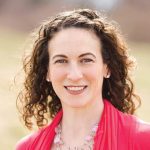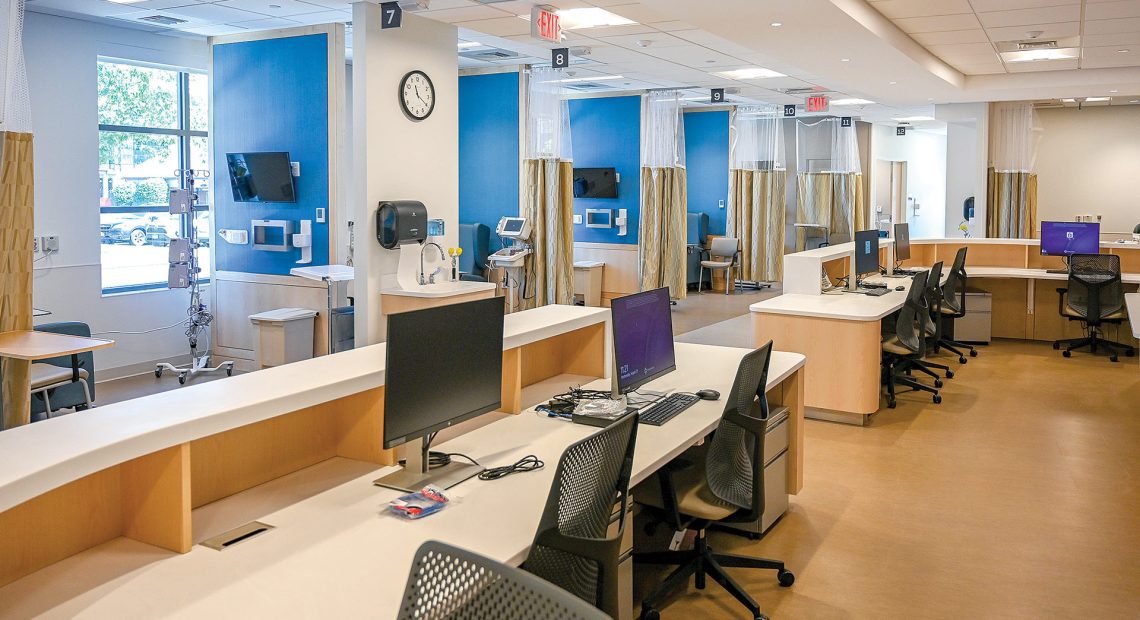
Reopened Karen Davis Krzynowek Cancer Center Meets Growing Needs
A Holistic Approach
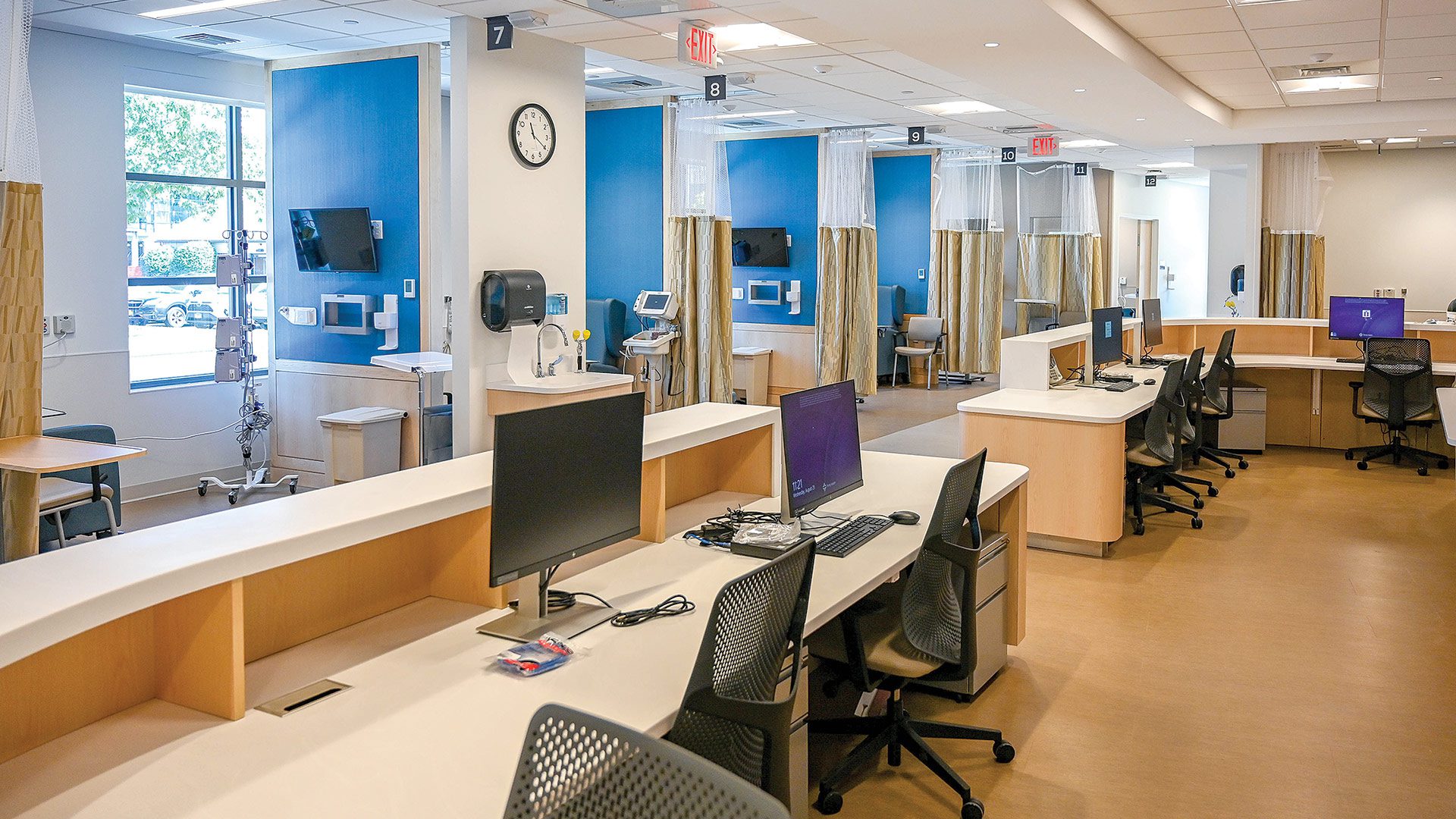
The infusion spaces at the cancer center were designed to be calming and comfortable.
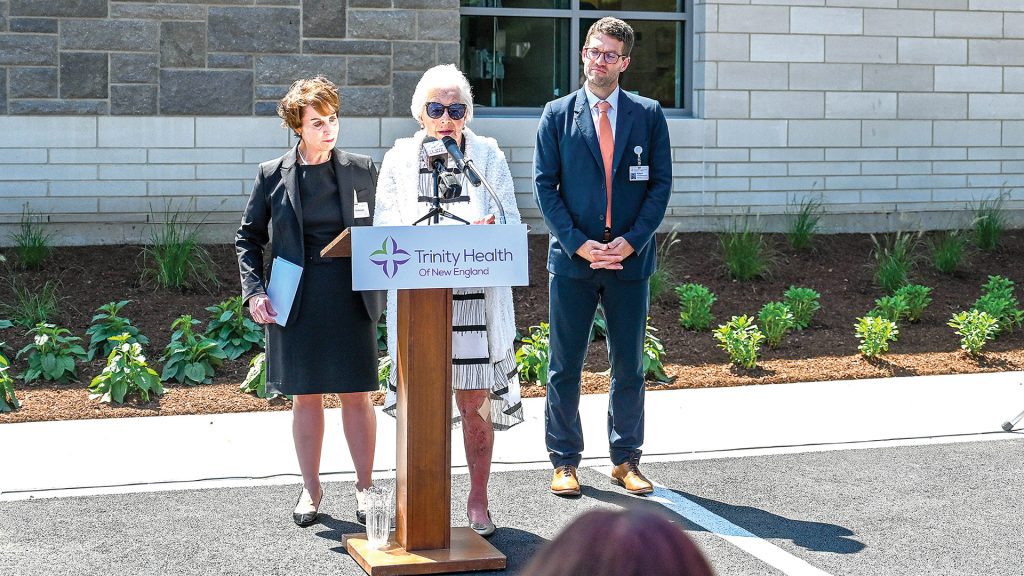
Helen Blake, whose daughter the center was named after, speaks at the ribbon-cutting ceremony alongside Deborah Bitsoli, president of Trinity Health Of New England Medical Group, and Dr. Robert Roose.
Sometimes, opportunity is born from a flood of difficulty. Or, simply, a flood.
That was the starting point, anyway, of what has become a $6 million construction and renovation project to renovate and add 5,500 square feet to the Karen Davis Krzynowek Cancer Center at Johnson Memorial Hospital in Enfield, Conn.
“About 16 months ago, as a result of a flood that had occurred in the old cancer center, we took it upon ourselves to set out a vision for what we could do to enhance and expand oncology services for the patients in Enfield and the surrounding towns,” said Dr. Robert Roose, administrative officer for two Trinity Health of New England hospitals: Johnson and Mercy Medical Center in Springfield.
“From there, it became an opportunity for us to create a state-of-the-art facility with infusion bays with natural light, and to bring medical-office infusion, medical oncology, and radiation oncology under one roof in a newly expanded and beautiful space to better meet the needs of the patients receiving cancer care in and around this community.”
Indeed, the project brings all of Johnson’s outpatient cancer services together under one roof, allowing patients to receive multiple facets of their treatment in one location. In addition to improving accessibility for physician appointments, the project also includes new medical oncology infusion bays that feature privacy screening, personal televisions, and space to accommodate a supporting family member or friend.
“Having all those services there, and especially having our partners in radiation next door in that same building, ensures that patients don’t have to go to multiple locations to get different aspects of their care,” said Tory Murtha, director of Ambulatory Oncology.
“I think that is key for this population,” she went on. “They’re already not feeling well, they’re already stressed, and they have a lot of other things going on in their lives. If you’re telling them, ‘well, first you have to go here and here and here and here,’ I think that’s really hard. So if they can just come and see their physician, see their nurse, get their infusion, have some blood drawn, have holistic support staff with the financial navigators and the nurses and the social-work team, that helps them feel like, ‘oh, they’re looking at me from every angle, every aspect of my holistic well-being.’”
This enhanced, multi-disciplinary care will extend even to surgical services, Murtha noted.
“We’re going to be able to bring breast surgeons over to our space within this cancer center to see patients for those diseases, and have the medical oncologist there with them. That makes a huge difference when you’re a new patient and you’re able to have both physicians there from both modalities of care. And the surgical center is going to be next door. That’s huge.”
Tory Murtha
“Having all those services there, and especially having our partners in radiation next door in that same building, ensures that patients don’t have to go to multiple locations to get different aspects of their care.”
Indeed, the new Karen Davis Krzynowek Cancer Center is part of a broader, $40 million expansion and renovation project designed to create a comprehensive hub for outpatient services on the hospital’s Enfield campus. Once complete, the S. Prestley and Helen Blake Ambulatory Care Center will include an upgraded surgery center with four state-of-the-art operating rooms, recovery areas, and additional medical office space.
“You’ll notice some of the design elements between the two centers are going to match,” Roose said, “so that there’s some harmony in the appearance, very much elevating the physical space to match the care that’s provided, so that it is top-notch and really delivers on the promises we have made to meet the needs in the community.”
Under One Roof
Small changes make a difference in cancer care, medical oncologist Dr. Karishma Mehra said, noting, for example, that patients require a physical examination before they can be cleared to receive chemotherapy.
“It’s important to make receiving care as easy as possible for cancer patients. Now, with physician offices just steps away from the infusion area, patients can begin their treatment more quickly. They also have peace of mind knowing their physician is nearby.”
Other changes in the reopened center are aesthetic, aiming to boost calmness, stress reduction, and peace of mind, Murtha said.
“Having natural light coming in, even if it’s on a cloudy day, is important,” she explained, noting that multiple studies have bolstered the connection between sunlight and a positive mindset. She added that the color scheme and artwork on the walls are intended to be calming, as are amenities like heated seats and blankets in the infusion spaces. And designing large-enough rooms to sit with a family member was also important.
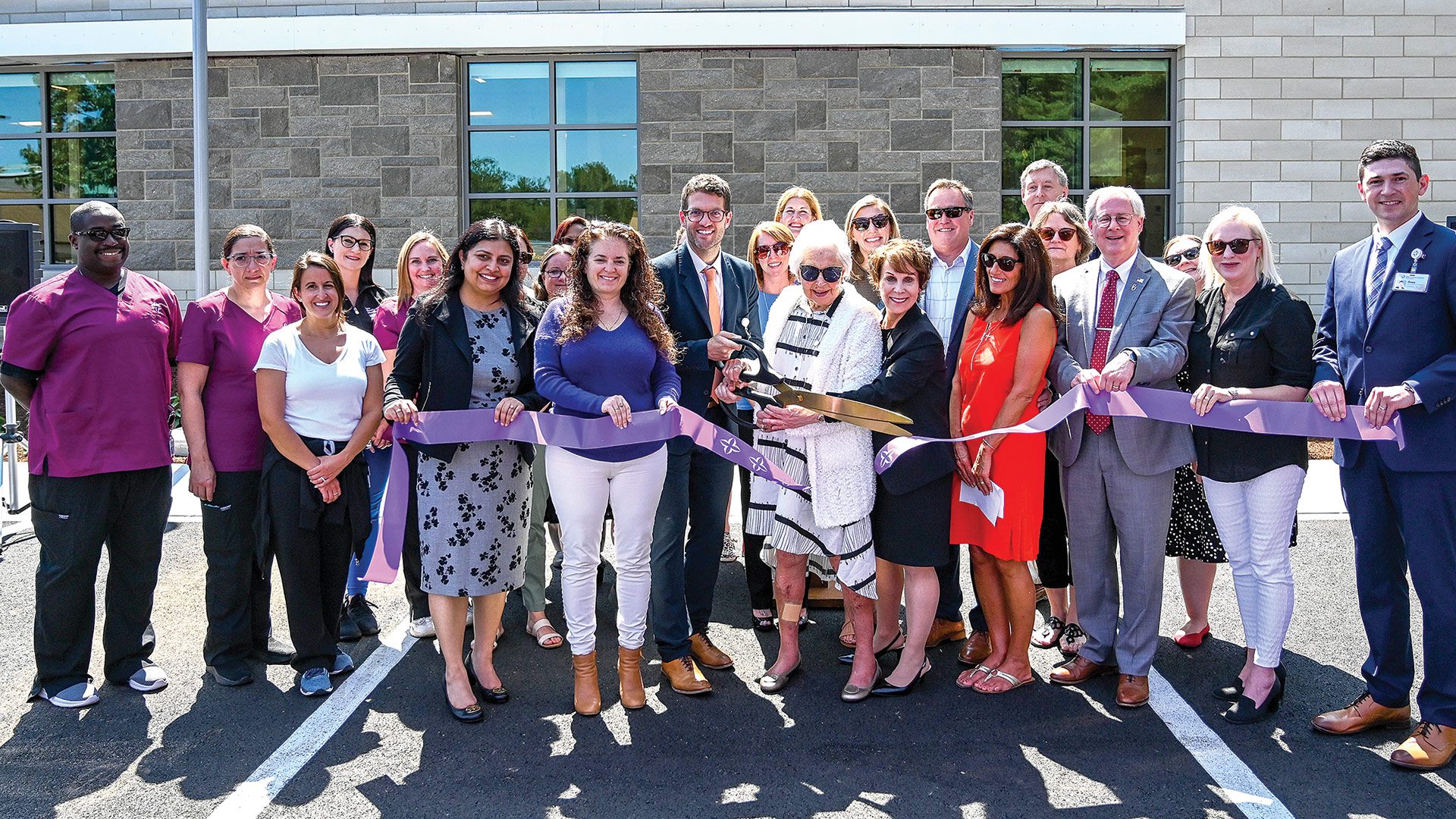
Helen Blake cuts the ribbon for the reopening of the Karen Davis Krzynowek Cancer Center, which is named in honor of Blake’s late daughter, who passed away after a six-year battle with cancer.
“Before, we really didn’t have that, and many times, especially going through COVID, there was not an opportunity for patients to have a family member with them,” she said. “Even if situations arise where we have to be judicious with how many people we allow in, there’s still enough space to allow caregivers and family members to be with them in their space.”
In addition, Murtha said, “it was important to ensure that, in the nursing station for the infusion area, there’s line of sight to every patient. It’s a big space, but you can still see everything, and that’s from a safety perspective, because we give a lot of medications that can have lots of reactions. So ensuring that the nurses have a line of sight to everybody was really important.”
Also, “one thing I love about the Trinity standards is making sure that everything you need is in the exam room,” she added. “So I can do your vital signs, I can take your weight, I can take your height, all in the exam room. You don’t have go to three different rooms to do different things.”
Murtha added that the employees at the cancer center, many of whom have worked there for 15 or 20 years, were gratified to return. “The people who work there, they stay because it is a family, and they do feel very dedicated to this location and to each other and to their patients.”
Enfield has been an important location for Trinity Health Of New England, Roose noted, sitting between its hospitals in Springfield (Mercy) and Hartford, Conn. (St. Francis Hospital and Medical Center).
“We recognize the needs of this community,” he told BusinessWest, “and we have prided ourself on providing great care in this community and very excited about some of the strategic expansions of services that are happening there, which include the renovation and the expansion of the Karen Davis Krzynowek Cancer Center.”
The idea, he added, was “ensuring that each individual has an environment that is comfortable, state-of-the-art, and beautiful, so that we can fully meet the biological, medical, psychological, spiritual, and social needs of each individual patient in this new space. Our mission is to be a transforming, healing presence in the community.”
Murtha added that Enfield is the health system’s fastest-growing market in the region.
“This is not a generalist model, like some smaller cancer centers. We have doctors that are dedicated to specific diseases to ensure that patients get that same level of high-level service that they would get at a large, academic cancer center.”
“Unfortunately, as people get older, we are seeing more and more cancers, and we’re also seeing a lot more cancers earlier on,” she said, partly due to more ambitious early screening recommendations.
“Even with our GI and our lung-cancer patients, we are seeing some of those a lot earlier now than we have historically. So I think it’s really important that ensure that we provide some specialized care. This is not a generalist model, like some smaller cancer centers. We have doctors that are dedicated to specific diseases to ensure that patients get that same level of high-level service that they would get at a large, academic cancer center. That’s another thing that we’ve really worked on to ensure that our patients get everything that they need in this location.”
Bottom Line
At the end of the day, Murtha said, while the building might be impressive, it’s really about the people.
“We want to make sure we’re holistically managing every patient that walks through the door, and their family members, because there’s a lot of burden on the caregivers, too. So we really do take a holistic approach when we meet each of them and ensure that we’re supporting them at every step of the way.”
Roose agreed, noting that “we are confident that these improvements will ease the cancer journey for many individuals in the greater Enfield community.”



